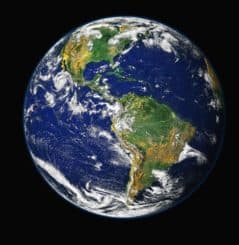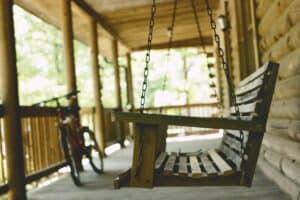
“Why is our church still using Styrofoam when we have meals together?”
The question struck me as strange, not because I disagreed with the thought behind it, and not even because I thought it was unimportant. It struck me because, in almost twenty years of ministry, it’s a question I had never heard…and never really expected to hear.
Evangelicals aren’t exactly known for their strong stances on environmental issues. For many, it’s almost as if the default stance is, “It’s all going to burn anyway, so it doesn’t really matter, does it?” It surprised me to hear a church member suddenly challenge me on that assumption.
Now, to be clear, we weren’t using Styrofoam because I didn’t care. I had never articulated it’s-all-going-to-burn-anyway position in my years as a pastor. In fact, I’m probably one of the few Southern Baptist Pastors in my local area who has gotten away with making a pro-environmentalist sermon point from time to time. It’s not that I didn’t care; it’s just that I had never really thought about it.
“I guess Styrofoam is cheaper,” I responded, promising that I’d look into switching to something more sustainable.
I wondered if there would be pushback, but other than one or two vague reminders that the budget was tight, the conflict never materialized. Mostly, I just received the same deer-in-the-headlights looks that I probably had the day I was first asked the question. So, I went ahead and made the switch over to recyclable paper products. It cost us about ten extra dollars a month, and we had to deal with some seriously soggy paper plates at the youth spaghetti fundraiser the next month, but everyone pretty much took it all in stride.
Unfortunately, this is about as far as most evangelicals are willing to go when it comes to environmental and climate justice. Merely bringing up the phrase in most evangelical settings is likely to get you much more than just a deer-in-the-headlights look. Many evangelicals still deny there is even a problem, and those who are willing to entertain the question see very little connection to their faith.
Of all people, Christians should be leading the way in standing up and defending the world God created.
This is a shame. Of all people, Christians should be leading the way in standing up and defending the world God created. The truth is, though, that many of us have gotten far too good at cordoning off our faith from our daily lives. We’ve insulated ourselves from having to think critically about how the issues of our time intersect with it. We want to believe that our faith is merely a private matter, but it’s not that simple. Our faith doesn’t just speak to us individually; it also casts a vision for what society is supposed to look like and demands that we participate in that vision. The current climate crisis is relevant to our faith because it is the direct result of three of the great sins of our age.
Disregard for the Land
A careful reading of Scripture contends that, as humans, our existence is closely linked to the welfare of the land. To a pre-modern ear, this would have been intuitive: Of course, our well-being depends on the health of the land. In modern western culture, however, we have insulated ourselves from this truth, putting layers between ourselves and the land that sustains us. When I shop under the harsh glow of fluorescent lights in a slickly polished suburban supermarket, it takes intentionality to remember that my food doesn’t originate in a Kroger distribution center. As a Christian, I have to think twice to recognize that I was created from the ground, to care for a land which is at the center of God’s covenant promises to us. The disregard that our modern western society has shown for the earth is a direct act of defiance against the witness of our faith.
Lack of Long-Term Perspective
In Genesis, Abraham rejoices in the promise God gives to him and his children. He rejoices even though he knows it is a promise he’ll never live to see. He dedicates the rest of his life to that promise, sacrifices for it, and instills hope into his children and grandchildren, even though he has nothing personally to gain from it. Contrast this with the attitudes of those who lobby against environmental action. The basic argument seems to be something along the lines of, “We can’t cut back on emissions because it will hurt the economy right now.”
This summer, we were all reminded of the shortsightedness of this argument by a 16-year-old activist from Sweden. Greta Thunberg stood before us and, in essence, said “How dare you.” She reminded us, or at least those of us who were listening, that we are selling off our children’s future for financial gain. What can we say in the face of that indictment? What excuse, what amount of profit could possibly justify the things we are doing to our children?
Economic Injustice
“They sell the innocent for silver, the needy for a pair of sandals” (Amos 2:6). The prophet Amos could just as easily have delivered this indictment to 21st Century America as he did to his people more than 2,500 years ago. One of the little-discussed impacts of the current climate crisis is its disproportionate impact on the poorest and most vulnerable. Think back to Hurricane Katrina. Of the more than 1,800 confirmed fatalities caused by the storm, about 85% of them were in New Orleans, a city whose poverty rate is more than twice the national average. Who can forget the images of hundreds of people walking out of the city on the freeways because they lacked access to the basic transportation they needed to get out of harm’s way?
This is not an isolated incident. The 2011 Haiti earthquake that killed between 100,000 and 160,000 people was a 7.0 on the Richter scale. By contrast, the Los Angeles Earthquake of 1994, which was nearly the same intensity, killed only 57. Why the enormous difference? Haiti is the most impoverished nation in the western hemisphere, which leaves the population more vulnerable to things like natural disasters and climate change. The injustice in the climate crisis is that the world’s poorest and most vulnerable are finding themselves at the epicenter of a debate being waged by the wealthiest and most powerful. To borrow the prophet Amos’s thought, we are literally selling the poor for a price, endangering the most vulnerable to insulate the profits and portfolios of the wealthy.
The injustice in the climate crisis is that the world’s poorest and most vulnerable are finding themselves at the epicenter of a debate being waged by the wealthiest and most powerful.
I won a small battle at my tiny evangelical church a few years ago. The world’s landfills have just a little bit less Styrofoam in them because the people of that church were willing to spend a few extra dollars a month and deal with saggy spaghetti plates. When it comes to substantive action, however, evangelicals have been slow to react and quick to push back.
But our faith demands action. It demands that we stand at the front lines, willing to sacrifice today’s excess for the future of our children. Our faith requires us to take up the cause of the poor and the marginalized. In short, the gospel calls us to live differently, not just as isolated individuals, but as members of a larger society.
 Jason Koon is a former Southern Baptist Pastor and member of the Religious Right. He now writes at the intersection of faith and politics, advocating for justice, compassion, and inclusion in the Church and the world. Visit his blog, Almost Evangelical, to read more.
Jason Koon is a former Southern Baptist Pastor and member of the Religious Right. He now writes at the intersection of faith and politics, advocating for justice, compassion, and inclusion in the Church and the world. Visit his blog, Almost Evangelical, to read more.


